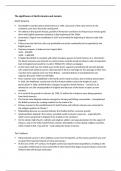The significance of North America and Jamaica
North America
Christopher Columbus discovered America in 1492, and much of the early interest in the
continent came from the Dutch and Spanish
The defeat of the Spanish Amada, growth of Puritanism and desire to find precious metals (gold)
drove the English expansion westward at the beginning of the 1600s
Jamestown, Virginia was established in 1607 and marked the beginning of tobacco trade with
England
Tobacco became the first cash-crop (profitable and easily marketable) to be exploited by the
English gentry
Maximum imports of tobacco from Virginia (lbs):
1625 – 200,000
1638 – 1,600,000
It helped the British to compete with other European powers in North America (i.e. the Dutch) –
the Stuart economy was boosted as customs taxes could be levied on tobacco when transported
back to England and would be crucial to William lll’s military campaigns
As the slave trade was not widely used at this point, vagrants and indentured servants (people
who would work without pay for a fixed period of time in exchange for free passage to their new
country) were regularly sent over from Britain – solved problems of unemployment and
vagrancy (but poor relief was still high)
More colonies were established in the North and in South Carolina, due to Puritan persecution –
in 1620, the Mayflower carried over the first Puritan settlers and at the height of Laud’s
persecutions in 1630, 20,000 Puritan refugees escaped to North America – and also as an
attempt to cure the overpopulation in England and because of the desire to open up new
markets
As a result of the growth in colonies, by 1700, 22 million lbs of tobacco were being exported
from North America
The Puritan New England colonies emerged as farming and fishing communities – strengthened
the British economy by creating markets for the trade of fur
Primary reason for the establishment for both Puritan and Catholic colonies was contempt for
the religious policies of Charles l
Shipbuilding became an essential industry that fuelled further economic growth
Newfoundland, England’s first colony, provided useful economic resources – especially fish –
which were transported to England to be traded on the continent
On the whole, High Church, Catholic and Anglican settlers ran large plantations for the export of
tobacco, and on the other hand Puritan colonies attempted to create deeply religious societies,
which traded in fish, crop and fur – both aiding the Stuart economy
The Caribbean
Initial colonial success in the Caribbean came from the Spanish, as they had a powerful navy and
occupied the important islands of Cuba and Jamaica
At the turn of the 17th century, the English carried out experimental expeditions, resulting in the
occupation of Bermuda in 1612 and St Kitts in 1624 where they began to grow tobacco and some
limited trade with Europe took place




